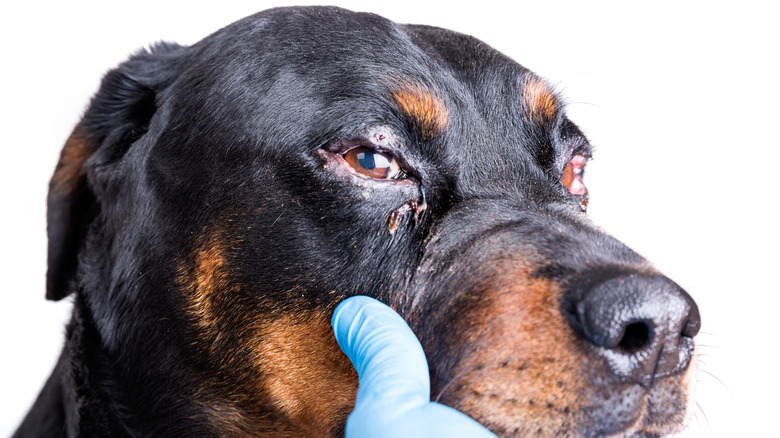How Your Pet's Allergies Can Lead To More Serious Conditions
All animals, including pets, can develop allergies to food, dust, fleabites, or certain chemicals. Mold, pollen, feathers, dust mites, and danger may trigger allergic reactions, too, according to VCA Animal Hospitals. Generally, dogs with allergies experience itching, coughing, sneezing, watery eyes, and digestive distress. Cats exhibit similar symptoms, including nausea and vomiting, localized reactions, and respiratory problems.
Pet allergies are usually treated with medications and ointments or through desensitization. For example, your vet may prescribe corticosteroids to keep inflammation under control. Antihistamines, on the other hand, can ease your pet's symptoms by suppressing histamine, a chemical that regulates the immune response, explains the American Osteopathic College of Dermatology. Treatment depends on the severity and type of allergy.
This health condition is more than just a nuisance. In some cases, pet allergies can become fatal or cause complications. Today's Veterinary Practice warns that pets may develop anaphylaxis, a life-threatening allergic reaction that requires emergency care. Other complications can impact your pet's skin, eyes, or internal organs, leading to lifelong problems.
Skin allergies may cause secondary infections in pets
Is your pet licking or chewing his paws or rubbing her face against the carpet? If this problem persists, it might be a sign of atopic dermatitis, says the American Animal Hospital Association. Atopic dermatitis impacts about 10% of dogs, being one of the most common skin allergies in pets. Its symptoms range from constant itching to sneezing and watery eyes. Dogs with skin allergies may also exhibit behavioral problems, such as excessive grooming, mounting, and chewing things around the house.
Cats can develop skin allergies, too. The symptoms are similar to those of canine atopic dermatitis and may include itchiness, crusts, and hair loss due to excessive scratching. This condition can also increase their risk of ear infections, causing even more itching and discomfort. You may also notice open sores and ulcers on your cat's skin, warns PetMD.
As the American Kennel Club notes, pets with skin allergies are prone to secondary infections. The constant scratching and licking may cause wounds that can become infected with bacteria or fungi. Some pets develop yeast dermatitis, a fungal infection characterized by dark spots, flaky or thickened skin, inflammation, redness, and foul odors. This problem may also increase the risk of ear infections, such as otitis externa.
Pet allergies can lead to electrolyte imbalances
Pets allergic to certain foods or chemicals may experience nausea, vomiting, and diarrhea, among other symptoms. For example, food allergies or intolerances can cause gas, bloating, loose stools, tummy pain, and weight loss in dogs. Vomiting and diarrhea are particularly problematic, as they can lead to dehydration and deplete your pet of sodium, potassium, and other electrolytes, warns Veterinary Emergency Group.
These trace minerals play a role in muscle and nerve function, nutrient transport, and cardiovascular health. They also regulate the body's fluid levels while helping the liver and kidneys flush out toxins, explains the U.S. National Library of Medicine. Just like their human companions, pets can develop electrolyte imbalances due to prolonged diarrhea, vomiting, or dehydration. If that happens, they may experience serious complications, such as bradycardia, or slow heart rate, cardiovascular problems, or even death, reports a 2017 study.
Your pooch might develop hearing or vision problems
As mentioned earlier, pet allergies cause all sorts of symptoms impacting the eyes and ears. Some problems, such as ocular discharge, can lead to conjunctivitis, notes Veterinary Emergency Group. If left unaddressed, this eye condition may worsen and cause vision loss. Ear infections, on the other hand, can result in deafness or permanent hearing problems.
Last but not least, pets with allergies may go into anaphylactic shock. Its symptoms include swelling beneath the skin, redness, low blood pressure, decreased heart rate, pale lips, hypothermia, and digestive distress. This severe allergic reaction can also cause difficulty swallowing, narrowing of the airways, shortness of breath, heart palpitations, and shock, explains Today's Veterinary Practice. Early intervention is essential.
All in all, don't take any risks when it comes to your pet's health. Allergies may not seem like a big deal, but the aftermath can be devastating. The best thing you can do is call the vet as soon as you notice anything unusual about your furry friend. Even small things like coughing, sneezing, or tummy pain could be a sign of something more serious.



